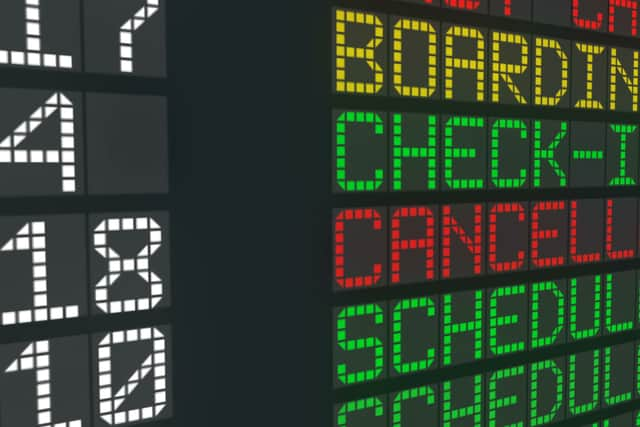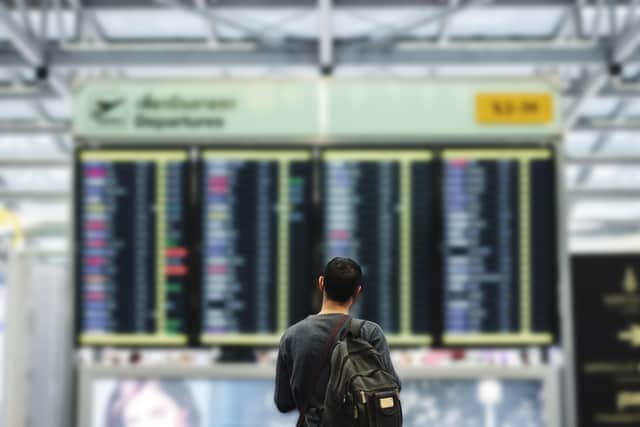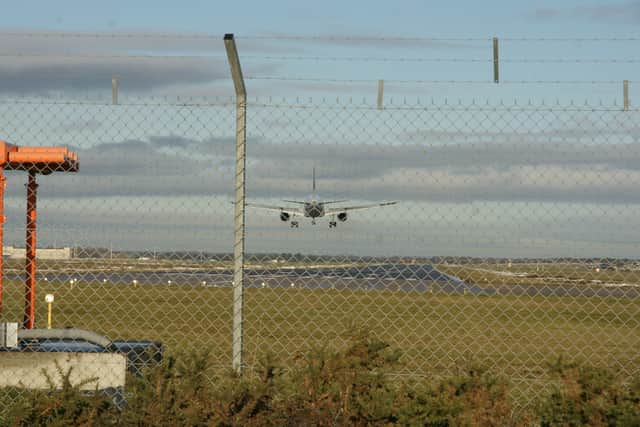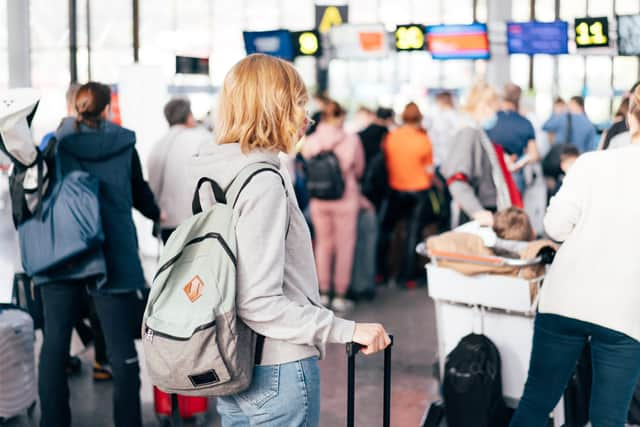Newcastle airport delays and cancellations: data to know post Covid-19
and live on Freeview channel 276
Where some airports in the UK are struggling with demand in a post Covid world, data shows that delays and cancellations at Newcastle airport haven't seen a rise.
The summer half-term holidays and Queen's Platinum Jubilee at the start of June saw some airports in the UK reporting queues out the door, delays and cancellations as many Brits looked to enjoy their first trip abroad since the arrival of Covid-19 restrictions in 2020.
Advertisement
Hide AdAdvertisement
Hide AdAirports in London and Manchester were hit particularly badly, but travellers at Newcastle Airport avoided the worst of queues with Newcastle Airport queues: Exact number of minutes it takes 99% of passengers to pass security">99% of flyers making it through security in six minutes or less.
Data unveiled by NationalWorld shows that in the first three months of 2022, 82.9% of flights at Newcastle Airport were on time.
That figure is a 2% increase on the flights in the first three months of 2019.
Fewer flights are also being delayed with 14.6% in 2022 compared with 17% in 2019, whilst cancellations have increased but only by 0.1%.
Here’s what’s happening nationwide.
Are more flights being cancelled?


Advertisement
Hide AdAdvertisement
Hide AdOfficial figures haven’t yet been released for the Easter and spring half-term holidays, when holidaymakers faced major disruption at many airports.
But figures have been released for the first three months of this year.
These show a total of 3,363 flights were cancelled across 26 major UK airports in the three months to the end of March.
This represents 1.5% of flights to or from these major UK airports, up from 0.9% of flights cancelled in the same period in 2019, figures from the Civil Aviation Authority (CAA) show.
Advertisement
Hide AdAdvertisement
Hide AdA spokesperson for the CAA said the emergence of the Omicron covid variant before Christmas “led to many flight cancellations and some key European markets imposing bans on UK travellers”.
Only flights cancelled at short notice are counted in the statistics. Cancelled flights are defined as those which are called off within 24 hours of the scheduled departure time.
Are more flights being delayed?


Officials count a flight as delayed if it is more than 15 minutes late.
Analysis of these figures shows 20% of flights were delayed in the first three months of this year in and out of the 26 major airports, counting domestic flights once.
Advertisement
Hide AdAdvertisement
Hide AdFigures on flight delays going back to 2019 are only available for 24 airports - and for the first three months of that year, the proportion of flights delayed was also 20%. So whether it was before or after the pandemic, around one in five flights was running behind schedule.
But some airports have more delayed flights than others.
Which are the worst airports for delays and cancellations?


In the first three months of this year, Doncaster Sheffield airport had the highest rate of delays, with 27% of flights running at least 15 minutes late. This was followed by Manchester, with 26% of flights delayed, and Heathrow, where 24% of flights ran behind schedule.
A spokesperson for Doncaster Sheffield Airport said: “We are always mindful that we provide an easy, friendly and relaxed service for our passengers and whilst it is unusual to experience long delays over 15 to 20 minutes for outbound travel from DSA, we are doing all that we can to alleviate delays for our customers. We advise passengers to check the most recent announcements from their airline and the airport before setting off on their journey.”
Belfast City had the best performance, with only 8% of flights running behind schedule.
Advertisement
Hide AdAdvertisement
Hide AdThe figures show that Southampton Airport had the highest cancellation rate for the first three months of this year, at 6.2%.
Nearly half of the 192 cancelled flights at Southampton were those run by Guernsey state-run carrier Aurigny Air Services to and from airports in the Channel Islands.
Both Southampton Airport and Aurigny Air Services were approached for comment.
This was followed by Aberdeen and London City airports, both with cancellation rates of 3.9%.
Advertisement
Hide AdAdvertisement
Hide AdSix airports reported no cancelled flights in the first three months of 2022. These were Belfast, Bournemouth, Cardiff, Doncaster Sheffield, Exeter and Teesside.
When delays and cancellations are combined, Manchester Airport had the worst overall performance. Less than three-quarters (72%) of flights left on time in the first three months of this year.
A Manchester Airport spokesman said: "On-time performance can be affected by a range of factors such as weather, technical issues, staff sickness and global air traffic control delays.
"We work closely with our third parties on site - airlines, handling agents and air traffic control to minimise delays as far as reasonably possible.”
Are airports busier than usual?


Advertisement
Hide AdAdvertisement
Hide AdMany people have been keen to return to taking trips abroad after years of lockdowns and restrictions.
But the figures for the first quarter of 2022 show passenger numbers were still far below pre-pandemic levels - suggesting it wasn’t an overwhelming number of passengers that lay behind the problems at airports.
Overall, 31.4 million passengers flew in and out of the UK between January and March this year. This represents a 42% fall in passengers compared to the same period in 2019, before the coronavirus pandemic.
Aviation experts say it is a lack of trained and vetted staff, both within airports and on airlines, that is at the root of the problems.
Advertisement
Hide AdAdvertisement
Hide AdThe Airport Operators Association (AOA), the trade association representing the interests of airports across the UK said: “Airports anticipated it would be challenging at peak times as the industry seeks to re-start and have had big recruitment campaigns underway since before the start of this year. But until the restrictions were lifted, uncertainty about the future of travel made this difficult. Since then, there has been a very positive response and airports are now seeing additional staff completing the required vetting and training, and being deployed. As a result, while queues may be longer at certain times at some airports, most passengers are getting through airport security – and away on their holidays – smoothly.
“The focus now must be on continuing to improve the service to customers. Airports are working closely with airlines and ground handling companies to facilitate check in, baggage handling and on-time departures. We will work closely with them and with government to ensure we are ready for the summer getaway – the first proper summer holiday period since the start of the pandemic.”
Comment Guidelines
National World encourages reader discussion on our stories. User feedback, insights and back-and-forth exchanges add a rich layer of context to reporting. Please review our Community Guidelines before commenting.
